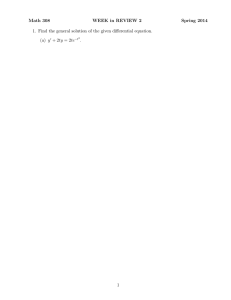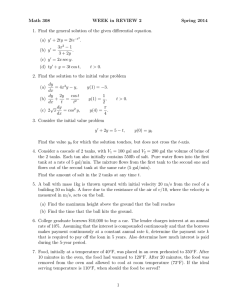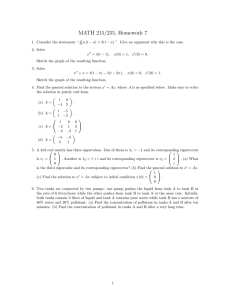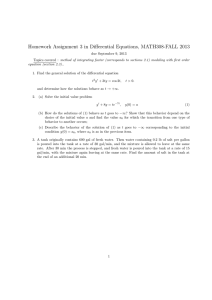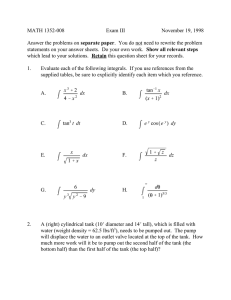Tech Tips Aviation Management Technology &
advertisement
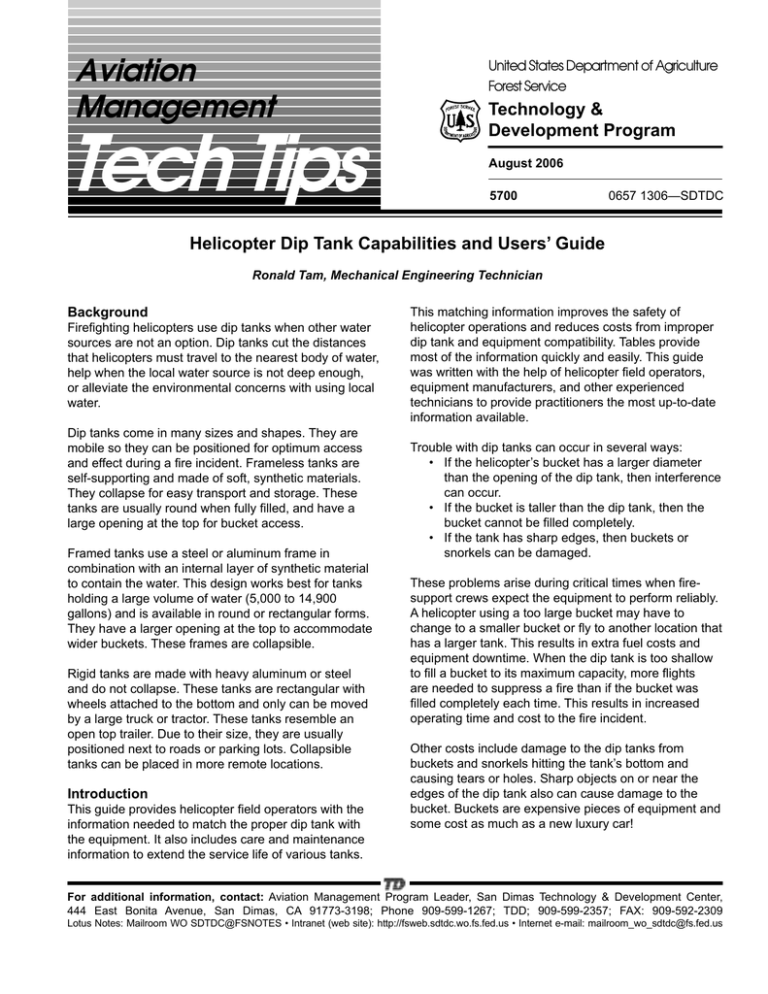
Aviation Management United States Department of Agriculture Forest Service Technology & Development Program Tech Tips August 2006 5700 0657 1306—SDTDC Helicopter Dip Tank Capabilities and Users’ Guide Ronald Tam, Mechanical Engineering Technician Background This matching information improves the safety of helicopter operations and reduces costs from improper dip tank and equipment compatibility. Tables provide most of the information quickly and easily. This guide was written with the help of helicopter field operators, equipment manufacturers, and other experienced technicians to provide practitioners the most up-to-date information available. Firefighting helicopters use dip tanks when other water sources are not an option. Dip tanks cut the distances that helicopters must travel to the nearest body of water, help when the local water source is not deep enough, or alleviate the environmental concerns with using local water. Dip tanks come in many sizes and shapes. They are mobile so they can be positioned for optimum access and effect during a fire incident. Frameless tanks are self-supporting and made of soft, synthetic materials. They collapse for easy transport and storage. These tanks are usually round when fully filled, and have a large opening at the top for bucket access. Trouble with dip tanks can occur in several ways: • If the helicopter’s bucket has a larger diameter than the opening of the dip tank, then interference can occur. • If the bucket is taller than the dip tank, then the bucket cannot be filled completely. • If the tank has sharp edges, then buckets or snorkels can be damaged. Framed tanks use a steel or aluminum frame in combination with an internal layer of synthetic material to contain the water. This design works best for tanks holding a large volume of water (5,000 to 14,900 gallons) and is available in round or rectangular forms. They have a larger opening at the top to accommodate wider buckets. These frames are collapsible. These problems arise during critical times when firesupport crews expect the equipment to perform reliably. A helicopter using a too large bucket may have to change to a smaller bucket or fly to another location that has a larger tank. This results in extra fuel costs and equipment downtime. When the dip tank is too shallow to fill a bucket to its maximum capacity, more flights are needed to suppress a fire than if the bucket was filled completely each time. This results in increased operating time and cost to the fire incident. Rigid tanks are made with heavy aluminum or steel and do not collapse. These tanks are rectangular with wheels attached to the bottom and only can be moved by a large truck or tractor. These tanks resemble an open top trailer. Due to their size, they are usually positioned next to roads or parking lots. Collapsible tanks can be placed in more remote locations. Other costs include damage to the dip tanks from buckets and snorkels hitting the tank’s bottom and causing tears or holes. Sharp objects on or near the edges of the dip tank also can cause damage to the bucket. Buckets are expensive pieces of equipment and some cost as much as a new luxury car! Introduction This guide provides helicopter field operators with the information needed to match the proper dip tank with the equipment. It also includes care and maintenance information to extend the service life of various tanks. For additional information, contact: Aviation Management Program Leader, San Dimas Technology & Development Center, 444 East Bonita Avenue, San Dimas, CA 91773-3198; Phone 909-599-1267; TDD; 909-599-2357; FAX: 909-592-2309 Lotus Notes: Mailroom WO SDTDC@FSNOTES • Intranet (web site): http://fsweb.sdtdc.wo.fs.fed.us • Internet e-mail: mailroom_wo_sdtdc@fs.fed.us 1 Natural hazards (sun and heat) can damage the tank’s synthetic fabric if improperly stored. Mildew can form inside a wet tank causing foul odors. Also, rodents have been known to chew holes into the tank’s fabric. Product Specification and Prices Table 1 lists dip tank, bucket, helicopter, and helicopter belly-tank manufacturers and vendors. It includes the product name, model number, capacity, dimensions, and per unit price of the items. Some of the boxes in the table have “N/A” because the information is not available. Company names are listed in alphabetical order. The prices were current when this guide was posted on the U.S. Department of Agriculture (USDA) Forest Service San Dimas Technology and Development (SDTDC) Intranet Web site and are subject to change. Table 1—Product specifications and prices. Dip Tank Manufacturer/Vendor Product Model Number Capability Dimensions (gallons) Price ($) Fol-Da-Tank Frameless/Portable tanks SSTFS-500 500 3ft x 5ft x 6ft 6in 714 Frameless/Portable tanks SSTFS-1000 1,000 4ft x 7ft x 8ft 2in 1,050 Frameless/Portable tanks SSTFS-1200 1,200 4ft x 7ft x 8ft10in 1,102 Frameless/Portable tanks SSTFS-1600 1,600 4ft x 7ft x 9ft 6in 1,207 Frameless/Portable tanks SSTFS-1800 1,800 4ft x 7ft x 9ft10in 1,312 Frameless/Portable tanks SSTFS-2000 2,000 4ft x 7ft x 10ft 8in 1,680 Frameless/Portable tanks SSTFS-2500 2,500 4ft x 8ft x 12ft 6in 1,837 Frameless/Portable tanks SSTFS-3000 3,000 4ft x 9ft10in x 13ft 1in 2,257 Frameless/Portable tanks SSTFS-4000 4,000 4ft x 12ft 2in x 16ft10in 2,940 Frameless/Portable tanks SSTFS-4800 4,800 5ft x 11ft x 16ft 3,200 Frameless/Portable tanks SSTFS-5000 5,000 4ft x 13ft x 17ft 6in 3,360 Frameless/Portable tanks SSTFS-6000 6,000 5ft x 12ft x 17ft 3,600 Frameless/Portable tanks SSTFS-10000 10,000 6ft 8in x 12ft x 19ft 8in 5,800 Frameless/Portable tanks SSTFS-14000 14,000 7ft 9in x 21ft 8in 6,850 DBL-HI DBLH-2000 2,000 90in x 90in x 60in 5,040 DBL-HI DBLH-3000 3,000 108in x 108in x 60in 5,265 «Fireflex»/Water Reservoir FFTF-0112* 120 60-inD x 23-inH 704 «Fireflex»/Water Reservoir FFTF-0253* 300 84-inD x 32-inH 770 “Fireflex”/Water Reservoir FFTF-0506* 600 84-inD x 38-inH 969 “Fireflex”/Water Reservoir FFTF-1012* 1,200 124-inD x 40-inH 1,191 “Fireflex”/Water Reservoir FFTF-1518* 1,800 133-inD x 48-inH 1,517 “Fireflex”/Water Reservoir FFTF-2530* 3,000 164-inD x 48-inH 1,838 “Fireflex”/Water Reservoir FFTF-4048* 4,800 195-inD x 60-inH 3,140 “Fireflex”/Water Reservoir FFTF-5060* 6,000 209-inD x 60-inH 4,021 SEI Industries “Fireflex”/Water Reservoir FFTF-80100* 6,000 236-inD x 80-inH 4,622 “Fireflex”/Water Reservoir FFTF-120144* 10,000 260-inD x 93-inH 6,408 “Heliwell”/Portable tanks HW-0500* 5,650 12-ft-8inD x 6-ftH 10,618 “Heliwell”/Portable tanks HW-0700* 7,100 12-ft 8-inD x 8-ftH 11,532 “Heliwell”/Portable tanks HW-1000* 9,425 12-ft 8-inD x 10-ftH 13,088 “Heliwell”/Portable tanks HW-1500* 14,900 16-ftD x 10-ftH 16,154 2 Firetak Portable water tanks (F-series) FF-2300 600 7.5-ftD x 40-inH 925 Portable water tanks (F-series) FF-4500 1,200 9.5-ftD x 40-inH 1,095 Portable water tanks (F-series) FF-7700 2,000 11-ftD x 54-inH 1,295 Portable water tanks (F-series) FF-9500 2,500 12-ftD x 54-inH 1,395 Portable water tanks (F-series) FF-11300 3,000 13-ftD x 54-inH 1,450 Portable water tanks (F-series) FF-15000 4,000 14.5-ftD x 54-inH 1,850 Portable water tanks (F-series) FF-19000 5,000 17-ftD x 54-inH 2,350 N/A 6,400 8-ftW x 15-ftL x 8-ftH Capability Dimensions Price 45 22-inH x 32-inD 3,020 Aqua Express Heli-Troff 1,600/day * Impact pad available Buckets Product Model Number (gallons) HELiFIRE Helicopter Bucket HF-180 Helicopter Bucket HF-345 86 34-inH x 32-inD 3,775 Helicopter Bucket HF-500 125 24-inH x 42-inD 4,530 Helicopter Bucket HF-900 225 55-inH x 42-inD 6,040 Helicopter Bucket HF-1500 375 59-inH x 43-inD 7,382 Helicopter Bucket HF-2000 500 59-inH x 87-inD 8,054 Bambi Bucket 6072 72 28-inH 4,598 Bambi Bucket 8096 96 29-inH 4,858 Bambi Bucket 9011 108 29-inH 5,246 Bambi Bucket 1012 120 31-inH 5,534 Bambi Bucket 1214 144 33-inH 5,833 Bambi Bucket 1518 180 39-inH 6,580 Bambi Bucket 1821 210 41-inH 7,417 SEI Industries Bambi Bucket 2024 240 43-inH 8,448 Cobra Bambi Bucket 2732 324 48-inH 8,630 Bambi Bucket 3542 420 57-inH 9,317 Bambi Bucket 4453 530 57-inH 10,868 Bambi Bucket 5566 660 62-inH 15,338 Bambi Bucket 5870 700 58-inH 16,872 Bambi Bucket 6578 780 67-inH 17,460 Bambi Bucket 7590 900 73-inH 18,779 Bambi Bucket HL-5000 1,320 70-inH 22,041 Bambi Bucket HL-7600 2,000 86-inH 25,658 Bambi Bucket HL-9800 2,600 97-inH 28,549 K-MAX(BB680K) Bambi Bucket BB-680K 680 N/A 3 N/A Belly Tank System Product Model Number Capability Dimensions Price (gallons) Isolair Helicopter Systems Eliminator II Fire Fighting System 4600-205 323 N/A N/A Eliminator II Fire Fighting System 4600-212 323 N/A N/A Eliminator II Fire Fighting System 4600-214B 660 N/A N/A Eliminator II Fire Fighting System 4600-350B 250 N/A N/A Eliminator II Fire Fighting System 4600-350B3 250 N/A N/A Eliminator II Fire Fighting System 4600-W3A N/A N/A N/A Fire Attack System 301 301 238 N/A N/A Fire Attack System 304 304 369 N/A N/A Fire Attack System 308 308 264 N/A N/A Fire Attack System 310 310 237-317 N/A N/A Fire Attack System 311 311 291 N/A N/A Fire Attack System 314 314 2,000 N/A N/A Fire Attack System 316 316 600 N/A N/A Fire Attack System 323 323 1,200 N/A N/A Fire Attack System 327 327 200 N/A N/A Fire Attack System 10900-050 10900-050 780 N/A N/A Capability Dimensions Price 2,500 N/A N/A 1,057 N/A N/A 700 N/A N/A S-70A/UH-60L 1,000 N/A N/A S-76C 575 N/A N/A S-92 1,100 N/A N/A Simplex Manufacturing Helicopter Product Model Number (gallons) Canadian Air Crane Erickson Aircrane Helitanker S 64 Mil Aircraft Mi-14 Kaman Aerospace Corp. K-MAX with FIREMAX system Sikorsky Firehawk 4 Dip Tank and Bucket Compatibility Table 2 shows which buckets and dip tanks are compatible. It also shows how many full dips are available with that bucket, assuming that the dip tank is not refilled. The colored boxes in the table show which bucket and dip tank combination are compatible, free of interference, and capable of getting a full dip by the bucket. The colors also represent the number of dips available when the dip tank is filled to its maximum capacity and no refills are available. The color code only provides a rough estimate of the number of dips. During a real incident, the refill and usage rates can vary widely. These color codes assume the worst case situation when the refilling of the dip tank is not possible during usage. • Red - one dip is available with that particular combination. • Orange and yellow - two and three dips available, respectively. • Green - four or more dips are available. The number of dips available can increase in a real incident when the refill rate matches the usage rate. Some boxes have “N/C” in them to indicate this particular bucket and dip tank combination is not compatible due to interferences, incomplete dips, or the volume of the bucket is more than the dip tank. Having a suction system in the bucket, like the power-fill option from SEI Industries, allows tall buckets to get a complete fill from shallower dip tanks. Be aware that the external suction systems on the side of the bucket increase the chances for snagging with the edge of a dip tank. Table 3 provides the dry and filled weights of common helicopter buckets. The model number and volume capacity of each bucket are included. Dip Tank and Equipment Compatibility Table Table 4 shows which equipment and dip tank combinations are compatible. The equipment includes helicopters and helicopter belly-tank systems. The color code indicates the number of complete fills from each dip tank, assuming the dip tank is not refilled. The colored boxes in the table show which equipment and dip tank combination are compatible, free of interference, and capable of getting a full dip by the helicopter tank. The colors also represent the number of dips available when the dip tank is filled to its maximum capacity and no refills are available. The color code only gives a rough estimate of the number of dips. During a real incident, the refill and usage rates can vary widely, and this guide cannot predict what those rates may be. This is to assume the worst case situation when the refilling of the dip tank is not possible during usage. • Red - one dip is available with that particular combination. • Orange and yellow - two and three dips available, respectively. • Green - four or more dips are available. The number of dips available can increase in a real incident when the refill rate matches the usage rate. Boxes that have “N/C” in them indicate this particular equipment and dip tank combination is not compatible due to interferences or the volume of the helicopter tank is more than the dip tank. Note that a helicopter snorkel needs a depth of at least 18 inches for proper suction. Dip-Tank Maintenance and Care Information Dip tanks require maintenance to provide reliable service. Improper use, care, or storage techniques may result in damages and render the tank useless. Table 5 provides information on proper care tips from dip-tank manufacturers . Before the tank is put in service, clear away any sharp objects from the area where the tank will sit. Place a tarp between the ground and tank bottom to prevent minor tears from small rocks and objects. Ensure that the tank is placed on level ground to prevent it from rolling over. Strap the tank in place if necessary. For example, SEI Industries has ground pads for their Fireflex tanks. If an impact pad (figure 1) is available for your tank, place it at the inner bottom of the tank to prevent contact damages from a falling bucket or a snorkel hitting the bottom. Note that the steel-reinforced snorkel from an Erickson Air-Crane can cause severe damage to a tank bottom. 5 6 ��������������� �������� ������� ����������� ������� ����������� ������� ����������� ������� ������������ ��������������� �������� ��������� ��������� ��������� ��������� ��������� ��������� ��������� ����������� ��������� ����������� ��������� ����������� ��������� ����������� ��������� ����������� ���������� ����������� ����������� ������������ ������������������ ��������� ����������� ��������� ����������� ����������� ������������������ ��������� ��������� ���������� ����������� ���������� ����������� ���������� ����������� ���������� ����������� ���������� ����������� ���������� ����������� ���������� ����������� ���������� ����������� ���������� ����������� ���������� ����������� ���������� ����������� ����������� ������������ ����������� ������������ ������������������ ������ ��������� ������ ����������� ������ ����������� ������ ����������� ������� ����������� ������� ����������� ������� ����������� ���������� ����������� ������������ ��������� ������� ��������������� ������������ ��� ���� �������� ��� ���� �������� ��� ���� ��������� ��� ���� ��������� Table 2—Dip Tank and Bucket Compatability. ��� ��� ��� ��� ��� ��� ��� ���� ��������� ��� ��� ���� ��������� ��� ���� ��������� ��� ��� ��� ��� ��� ��� ��� ��� ��� ��� ��� ��� ��� ���� ��������� ��� ���� ��������� ��� ��� ��� ��� ��� ��� ��� ��� ��� ��� ��� ��� ��� ��� ��� ��� ��� ��� ��� ��� ��� ��� ��� ��� ��� ��� ��� ��� ��� ��� ��� ��� ��� ��� ��� ��� ��� ��� ��� ��� ��� ��� ��� ��� ���� ��������� ��� ��� ���� ��������� ��� ��� ��� ��� ��� ��� ��� ��� ��� ��� ��� ��� ��� ��� ��� ��� ��� ��� ��� ��� ��� ��� ��� ���� ��������� ��� ��� ��� ��� ��� ��� ��� ��� ��� ��� ��� ��� ��� ��� ��� ��� ��� ��� ��� ��� ��� ��� ��� ��� ��� ��� ��� ��� ��� ��� ��� ��� ��� ��� ��� ��� ��� ��� ��� ��� ��� ��� ��� ��� ��� ��� ��� ���� ��������� ��� ��� ��� ��� ��� ��� ��� ��� ��� ��� ��� ��� ��� ��� ��� ��� ��� ��� ��� ��� ��� ��� ���� ��������� ��� ��� ��� ��� ��� ��� ��� ��� ��� ��� ��� ��� ��� ��� ��� ��� ���� ��������� ��� ���������� ��� ��� ��� ��� ��� ��� ��� ��� ��� ��� ��� ��� ��� ��� ��� ��� ��� ��� ��� ��� ��� ��� ��� ��� ��� ��� ��� ��� ��� ������ ����������� ��� ��� ��� ��� ��� ��� ��� ��� ��� ��� ��� ��� ��� ��� ��� ��� ��� ��� ��� ��� ��� ��� ��� ��� ��� ��� ��� ��� ��� ��� ��� ��� ��� ��� ��� ��� ��� ��� ��� ��� ��� ��� ��� ��� ��� ��� ��� ������ ����������� ��� ��� ��� ��� ��� ��� ��� ��� ��� ��� ��� ��� ��� ��� ��� ��� ��� ��� ��� ������ ����������� ������������ � � � ��������� ���� ��������� �������� ������ �������� ��� ��� ������ �������� ��� ������ ��������� ��� ��� ��� ��� ��� ��� ��� ��� ��� ��� ��� ��� ��� ��� ��� ��� ��� ��� ��� ��� ��� ��� ������ ��������� ��� ��� ��� ��� ��� ��� ��� ��� ��� ��� ��� ��� ��� ��� ��� ��� ��� ��� ��� ��� ��� ��� ��� ������� ��������� ��� ��� ��� ��� ��� ��� ��� ��� ��� ��� ��� ��� ��� ��� ��� ��� ��� ��� ��� ��� ��� ��� ��� ������� ��������� Table 3—Bucket weight. Bucket Weight Empty (Lbs.) Full Load (Lbs.) SEI Industries Bambi Bucket 6072 (72 gal) 66 666 8096 (96 gal) 70 870 9011 (108 gal) 70 971 1012 (120 gal) 72 1,072 1214 (144 gal) 73 1,273 1518 (180 gal) 75 1,574 1821 (210 gal) 76 1,876 2024 (240 gal) 135 2,135 2732 (320 gal) 154 2,853 3542 (420 gal) 167 3,667 4453 (530 gal) 170 4,587 5566 (660 gal) 304 5,805 5870 (700 gal) 330 6,170 6578 (780 gal) 356 6,846 7590 (900 gal) 375 7,775 HL5000 (1,320 gal) 390 11,390 HL7600 (2,000 gal) 465 17,115 HL9800 (2,600 gal) 530 22,180 HF-180 (45 gal) 82 458 HF-345 (86 gal) 82 800 HF-500 (125 gal) 82 1,125 HF-900 (225 gal) 82 1,959 HF-1500 (375 gal) 82 3,210 HF-2000 (500 gal) 82 4,252 HELiFIRE 7 8 ��������� ��������������� ��������������� �������� ����������������� ���� ����������������� ���� ����������������� ���� ���������������� ���� ��������������� �������� ��������� ��������� ����������������� ���� ��������� ��������� ��������� ����������� ��������� ����������� ��������� ����������� ��������� ����������� ��������� ����������� ���������� ����������� ����������� ������������ ���������������� �� ��������� ����������� ��������� ����������� ����������� ��������� �������� ��������� ��������� ���������� ����������� ���������� ����������� ���������� ����������� ���������� ����������� ���������� ����������� ���������� ����������� ���������� ����������� ���������� ����������� ���������� ����������� ���������� ����������� ���������� ����������� ����������� ������������ ����������� ������������ ����������� ������� ������������������ ���� ������������������� ���� ������������������� ���� ������������������� ���� ������� ����������� ������� ����������� ������� ����������� ������������ ��������������������� ���� ��������� ������������ �������� ������������ ������������������� ������� ��� ��� ��� �������� ��������� ��� �������� ��������� ��� ��� ��� ��� ��� ��������� ��������� ��� ��� ��������� ��������� ��� ��� ���������� ��������� Table 4—Dip tank and equipment compatability. ��� ��� �������� ��������� ������ ������������ ���������������� ������ ��� ��� ��� ��������� ��� ��� ��� ��������� ��� ��� ��� ��������� ��� ��� ��� ��������� ��� ��� ��� ��������� ��� ���������� ��� ��� ��� ��� ��� ��� ��� ��� ��� ��� ��� ��� ��� ��� ��� ��� ��� ��� ��� ��� ��� ��� ��� ��� ��� ��� ��� ��� ��� ��� ��� ��� ��� ��� ��� �������������� �������� ������������������ ���� ��� ���������� �������� ��� ����� ��� ��� ��� ��� ��������� ��������� ��� ��� ��� ��������� ��� ��� ��� ��� ��� ��� ����������� ��� ��� ��� ��� ��������� ��� ��� ��� ��� ��� ��� ����������� ������������ � � � ��������� ���� ��������� ��� �������� ��� ��� ��� ��� ��� ��� ��� ��� ��� �������������������� ���� ����� ��������� ����� ��� ��� ��� ��� ��� ����������� ������� ������������������ ���� �������� ��� ��� ��� ��� ��� ��� ��� ������������ �������� ����������� Table 5—Maintenance and care. Manufacturer Maintenance/Care Information Firetak Dry off completely before storage. Patch inside of tank for maximum effectiveness. 4-inch-diameter patch kits with glue available from manufacturer. Pest control spray will not damage material. Mildew will not degrade material. Carrying case available to prevent damage during storage. SEI Industries Dry completely for a day before storage. Dry by hanging upside down. Mildew will not degrade material. Pest spray will not damage tank material. Impact pad available for Firelflex and Heliwell tanks. Use plastic top caps on Heliwell tanks. Fol-Da-Tank Use any household cleaner for mildew problem. Keep liner dry after cleaning. Mildew will not degrade material. Pest control spray will not damage material. ����������� ������������� ���������� ���������� Figure 1—Dip tank with tarp and impact pad. To prolong a synthetic tank’s life, store the tank in a dry, cool, and dark area when not in use. Rodents, and other pests, also can cause damage to tanks. Rats and mice have been known to chew small holes into the tank’s vinyl fabric in search of food, water, and shelter during the colder months. Applying pest control sprays on the tank can prevent some rodent problems and not harm the synthetic material. One nontoxic solution to rodents is to apply peppermint or spearmint oils around the tanks. The oil’s scent repels these creatures. One company, Mouse Magic Repellent, makes pellets soaked in peppermint oil for an easy and mess-free application. Another nontoxic method is to apply the scent from rodent predators. Shake Away Rodent Repellent makes a fox- and bobcat-scented powder. Both of these products are available from Gardener’s Supply Company. 9 Acceptance of Dip Tanks At a fire incident, contractors with dip tanks may show up to get their equipment added into the incident. For dip tanks that are not listed in this guide, use these criteria to help determine whether to accept for use a non-listed tank. First, inspect for sharp surfaces. Nothing sharp or pointed should be inside the tank and at the upper outside sections of the tank. These areas are most likely to come in contact with a helicopter bucket or snorkel. Examples of sharp objects are jagged edges of a sheet metal, exposed screws or bolt heads, hooks, and pipes with sharp ends. Second, look for any object that will create interference with a bucket or snorkel. These objects can be ladders that have the potential to catch the side of a snorkel, edges that are not flush, support beams that can tangle with the bucket line, and pipes that can snag another object. Third, the dip tank must have a stable base. Its bottom has to rest on the ground or have support points that rest on the ground. The supports need to have large ground-contact pads so it does not sink into any soft soil or pavement. These supports not only prevent road damage but prevent the tank from tipping over if it starts to sink unevenly. A tank towed in by truck needs support other than its wheels. The brakes on the wheels can fail on a sloped surface and allow the tank to shift with unpredictable results. Fourth, the dip tank has to accommodate the largest buckets expected to be used in the incident. A dip tank is no good if a bucket will not fit in it. Purchase Sources Table 6 lists possible purchase sources for dip tanks, buckets, helicopters, and helicopter tank manufacturers mentioned in this guide. The list is alphabetical, with addresses, telephone numbers, Web sites, and product information. Information not available is noted with “N/A” in the box. This chart is only for information. Refer to table 1 for product details. SDTDC will update all tables in this guide with new products, manufacturers, and vendors when additional information is available (see table 6). Table 6—Possible purchase sources. Company Address Telephone Web site Item(s) Agusta Westland Yeovil, Somerset, BA20 2YB, United Kingdom 44 (0) 1935 475222 http://www.agustawestland.com Helicopters Aqua Express P.O. Box 290494, Phelan, CA 92329-0494 (760) 963-1763 N/A Mobile steel water tank Bell Helicopter P.O. Box 482, Fort Worth, TX 76101 (817) 280-2011 http://www.bellhelicopter.textron.com Helicopters Canadian Air Crane 7293 Wilson Avenue, Delta, B.C. Canada (604) 940-1715 http://www.air-crane.com Erickson Aircrane Helitanker Cascade Fire Equipment Company P.O. Box 4248, Medford, OR 97501 (800) 654-7049 http://www.cascadefire.com Fol-Da-Tank Erickson Air-Crane 3100 Willow Springs Rd., P.O. Box 3247, Central Point, OR 97502 (541) 664-7615 http://www.ericksonaircrane.com Erickson Aircrane Helitanker ETT Fire 751 Moon Branch Drive, Dadeville, AL 36853 (877) 827-2797 http://www.ettfire.com Fol-Da-Tank Eurocopter N/A (800) 232-0323 http://www.eurocopter.com Helicopters Firetak 1497 Dublin Avenue, Winnipeg, Canada R3E 3G8 (800) 475-5734 http://www.firetak.com Portable Water Tanks (F-Series) Fol-Da-Tank 1275 W. 11th Street, P.O. Box 110, Milan, IL 61264 (800) 637-8265 http://www.fol-da-tank.com Fol-Da-Tank Gardener’s Supply Company 64 Harvest Lane, Williston, VT 05495 (888) 833-1412 http://www.gardeners.com Mouse Magic & Shake Away Isolair Helicopter Systems 1620 N.W. Perimeter Way, Troutdale, OR 97060 (503) 492-2105 http://www.isolairinc.com Belly Tank Systems Nor E First Response 3890 Hammer Drive, Bellingham, WA 98226 (360) 647-5277 http://www.nor-e.com Fireflex and Heliwell tanks SEI Industries 7400 Wilson Avenue, Delta, British Columbia, Canada V4G 1E5 (604) 946-3131 http://www.sei-ind.com Fireflex and Heliwell Tanks (800) 946-4337 http://www.sikorsky.com Helicopters (866) 600-7827 http://www.starfireequip.com Fol-Da-Tank Sikorsky Star Fire Equipment 36846 AL Highway 91, Holly Pond, AL 35083 10 Contact Information For additional information on dip tank capabilities or this users’ guide, contact Ronald Tam at SDTDC. Phone 909– 599–1267 ext. 274, or by e-mail at: rontam@fs.fed.us. SDTDC wishes to thank the following persons for their technical assistance in preparing this guide: Alex Liau, Van Nuys Helicopter Tanker Base Arnold Ramirez, USDA Forest Service, Angeles National Forest Engine 25 SDTDC’s national publications are available on the Internet at: http://www.fs.fed.us/eng/pubs/. USDA Forest Service and U.S. Department of the Interior Bureau of Land Management employees also can view videos, CDs, and SDTDC’s individual project pages on their internal computer network at: http://fsweb.sdtdc.wo.fs.fed. us/. 11 The information contained in this publication has been developed for the guidance of employees of the U.S. Department of Agriculture (USDA) Forest Service, its contractors, and cooperating Federal and State agencies. The USDA Forest Service assumes no responsibility for the interpretation or use of this information by other than its own employees. The use of trade, firm, or corporation names is for the information and convenience of the reader. Such use does not constitute an official evaluation, conclusion, recommendation, endorsement, or approval of any product or service to the exclusion of others that may be suitable. activities on the basis of race, color, national origin, age, disability, and where applicable, sex, marital status, familial status, parental status, religion, sexual orientation, genetic information, political beliefs, reprisal, or because all or part of an individual’s income is derived from any public assistance program. (Not all prohibited bases apply to all programs.) Persons with disabilities who require alternative means for communication of program information (Braille, large print, audiotape, etc.) should contact USDA’s TARGET Center at (202) 720-2600 (voice and TDD). To file a complaint of discrimination, write USDA, Director, Office of Civil Rights, 1400 Independence Avenue, S.W., Washington, D.C. 20250-9410, or call (800) 795-3272 (voice) or (202) 720-6382 (TDD). USDA is an equal opportunity provider and employer. The U.S. Department of Agriculture (USDA) prohibits discrimination in all its programs and 12
